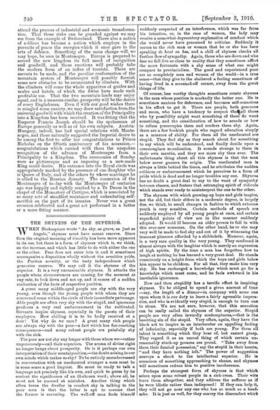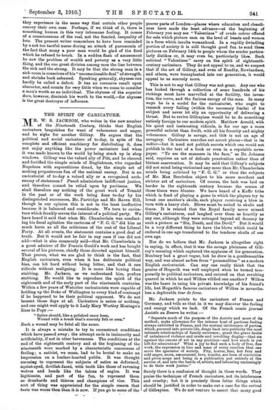THE SHYNESS OF THE SUPERIOR.
w-HEN Shakespeare wrote "As shy, as grave, as just as Angelo," shyness must have meant reserve. Since then the original meaning of timidity has been more apparent in its use, but there is a, form of shyness which is, we think, on the increase, and which has little to do with either the one or the other. Fear does not enter into it, and it sometimes accompanies a disposition wholly without the sensitive pride, the Puritan severity, or the testy independence which generates reserve. We may call it the shyness of the superior. It is a very unreasonable shyness. It attacks the people whom circumstances are causing, for the moment at any rate, to look down and not up, and it comes of a sudden realisation of the facts of respective position.
A great many middle-aged people are shy with the very young, even though the young people with whom they are concerned come within the circle of their immediate patronage. Able people are often very shy with the stupid, and ignorance produces a very real embarrassment in the cultivated. Servants inspire shyness, especially in the guests of their employers. How chilling it is to be badly received at a door ! Yet why do we care ? A great many rich people are always shy with the poor—a fact which has far-reaching consequences—and many robust people are painfully shy with the sick.
The poor are not shy any longer with those whom we—rather ungenerously—call their superiors. The aroma of divine right no longer hangs about prosperity. Or is it perhaps our own interpretation of their mental position,—the doubt arising in our own minds which makes us shy? To be entirely unembarrassed in conversation with an uneducated stranger a man must be in some sense a good linguist. He must be ready to talk a language not precisely like his own, and quick to guess by its context the significance of an ill-chosen word; above all, he must not be amused at mistakes. Another thing which often turns the dweller in comfort shy in talking to the poor man is that the latter is apt to assume that the former is assuming. The well-off man finds himself suddenly suspected of an interference, which was far from his intention, or, in the case of women, the lady may receive a somewhat deprecatory explanation of conduct which she would never have presumed to criticise. Suddenly it occurs to the rich man or woman that he or she has been speaking de haul en bar, and a, chill of shyness checks all further flow of sympathy. Again, those who are down and who fear no fall live so close to reality that they sometimes afflict the more fortunate with a ehy sense of wbat one might compare to provincialism. The good and experienced poor are so completely men and women of the world—in a true sense—that they give to the sheltered a feeling sometimes of having lived in a screened-off corner, away from the great things of life.
Of course, less worthy thoughts sometimes create shyness in the man whose position is markedly the better one. He is sometimes anxious for deference, and becomes self-conscious in his effort to get it. There are people, both generous and mean, who have a tendency to suspect thalall those who by possibility might want something of them ao want something, and the consideration of how to accede or how to refuse preoccupies them and renders them shy. Again, there are a few bookish people who regard education simply as a measure of ability. For them all the uneducated are stupid. They feel shy as they search about for something to say which will be understood, and finally decide upon a commonplace moralisation. It sounds strange to them in their own mouths, and they are more shy than ever. The unfortunate thing about all this shyness is that the man below never guesses its origin. The uneducated man is always a little behind the times, and he attributes the sudden coldness or embarrassment which he perceives to a form of pride which is dead and no longer troubles any one. Shyness has no doubt a great deal to say to the want of sympathy between classes, and fosters that estranging spirit of ridicule which stands ever ready to misinterpret the one to the other.
The shyness with which growing-up boys and girls inspire, not the old, but their elders in a moderate degree, is largely due, we think, to small changes in fashion to which extreme youth is very sensitive. Certain methods of speech are suddenly employed by all young people at once, and certain superficial points of view are in like manner suddenly adopted. It would ill become an older person to fall in with this ever-new nonsense. On the other hand, he or she may very well be made to feel shy and out of it by witnessing the innocent pleasure afforded by a shibboleth. Humour, again, is a very rare quality in the very young. They confound it almost always with the laughter which is merely an expression of high spirits. By the time a man has forgotten how to laugh at nothing he has learned a very great deal. He stands consciously on a height from which the boys and girls below him appear to be children. For all that, they make him very shy. He has exchanged a knowledge which must go for a knowledge which must come, and he feels awkward in his inevitable ignorance.
Now and then stupidity has a terrific effect in inspiring shyness. To be obliged to spend a given amount of time —say, the length of a dinner—in company with some one upon whom it is our duty to leave a fairly agreeable impres- sion, and who is evidently very stupid, is enough to turn one to stone. We are not sure, however, that this sensation can be really called the shyness of the superior. Stupid people are very often inwardly contemptuous,—that is the besetting sin of the stupid. Very often, again, they have the black art to inspire in an interlocutor an appalling feeling of inferiority, especially if both are young. For them all talent is something which they hear of, but cannot grasp. They regard it as an unreal thing of which certain un- reasonably stuck-up persons are proud. "Take away from them their fancied possession," say the stupid in their hearts, "and they have nothing left." The power of suggestion conveys a shock to the intellectual superior. He is conscious of something approaching to shame, and shyness will sometimes reduce him to positive incoherence.
Perhaps the strangest form of shyness is that which seizes upon some robust people in a sick-room. Their wits leave them altogether, and they address the sufferer as if he were idiotic rather than indisposed! If they can help it, they will not go near any one who has so much as a head- ache. It is just as well, for they convey the discomfort which
they experience in the same way that certain other people- convey their own ease. Perhaps, if we think of it, there is something human in this very inhumane feeling. It comes of a consciousness of the real, not the fancied, inequality of lots. The present writer remembers to have been reminded by a not too tactful nurse during an attack of pneumonia of the fact that many a poor man would be glad of the food which he refused to touch. In a sudden flash of amusement he saw the problem of wealth and poverty as a very little
• thing, and the one great division among men the line between the sick and the strong. It may be that the strong man in a sick-room is conscious of his "unconscionable deal" of strength, and shrinks back ashamed. Speaking generally, shyness can hardly be called a defect. It has no corrosive result upon character, and counts for very little when we come to consider a man's worth as an individual. The shyness of the superior does, however, diminish his worth to the world,—for shyness is the great destroyer of influence.











































 Previous page
Previous page